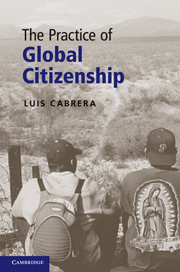Book contents
- Frontmatter
- Contents
- Preface
- Acknowledgments
- Introduction
- Part I Theoretical concerns
- Part II Global citizenship in practice
- Part III Advocacy and institutions
- 7 Regional citizenship and global citizenship
- 8 Advocacy duties and global democracy
- 9 Education and motivation for global citizenship
- Conclusion: the practice of global citizenship
- Appendix
- Works cited
- Index
9 - Education and motivation for global citizenship
Published online by Cambridge University Press: 05 June 2012
- Frontmatter
- Contents
- Preface
- Acknowledgments
- Introduction
- Part I Theoretical concerns
- Part II Global citizenship in practice
- Part III Advocacy and institutions
- 7 Regional citizenship and global citizenship
- 8 Advocacy duties and global democracy
- 9 Education and motivation for global citizenship
- Conclusion: the practice of global citizenship
- Appendix
- Works cited
- Index
Summary
Gingerly, the student held the prickly pear cactus pad as she picked her way through the thorned mesquite trees and brush growing in a dry river bed north of the border villages of Sasabe, Arizona and Sasabe, Sonora, Mexico. “Did someone really try to eat this?” she asked, indicating an oval piece neatly removed in the space between two clusters of spines. Closer inspection indeed revealed the indentations of human teeth. Such cactus pads, when diced and cooked with onions and peppers, are widely consumed as “nopalitos,” in Mexico. The hunger or thirst that had driven someone on one of southern Arizona’s migrant trails to try to eat a cactus pad raw left a deep impression on the student. She kept the pad, showing it to other classmates at the site, and later discussing it with her full class. Over time, and in part inspired by her experience in the desert, she assumed a lead role in a campus effort to collect food for needy children in the border city of Nogales, Sonora (see Cabrera and Anastasi 2008).
The student’s immediate empathic connection with the excluded other is in part the subject of this chapter. More centrally, the concern is with the implied, more comprehensively informed understanding of others, including those perceived as outsiders, which can lead to an acknowledgment of their moral standing and a greater willingness to discharge duties of contribution, accommodation, and advocacy. The promotion of such understanding has been at the core of efforts to introduce “education for global citizenship” into standardized school curricula in some countries. Many such efforts are both noteworthy and laudable for their focus on inculcating respect for a common humanity. They encourage young people to view themselves as embedded in an actual global community, and perhaps more implicitly, encourage them to take on some duties that transcend state citizenship, in particular duties of accommodation within increasingly diverse societies.
- Type
- Chapter
- Information
- The Practice of Global Citizenship , pp. 238 - 257Publisher: Cambridge University PressPrint publication year: 2010

